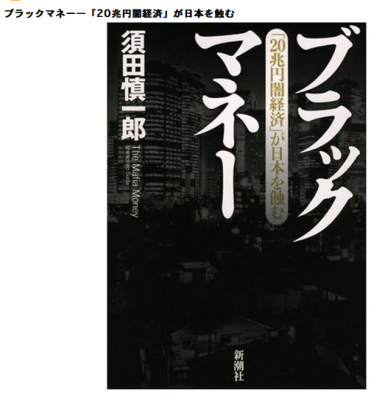I’ve been reading the book, Black Money (ブラックマネー)by Suda Shinichiro, which is a fairly good description of Japan’s nearly 20,000,000,000,000 yen underground economy. Yes, those figures are correct, by the way.

The yakuza invasion of Japan’s financial markets in recent years has been amazing and rapid. Prime Minister Koizumi (who’s grandfather was a yakuza and a member of the Yokosuka-Ikka which was later absorbed into Inagawa-kai crime group) , under encouragement from the Bush administration and with the advice of Miyauchi, the chairman of the Orix group, instituted a widespread relaxation of previous laws and regulations of the finance industry which made it possible for organized crime to get their foot in the door, and once they got inside the House Of Commerce, they decided to stay.
The modern yakuza, or the 成人ヤクザ, make their real money in loan-sharking, stock manipulation, real-estate speculation, and IPOs. They need a veneer of legitimacy to do this and that is usually done by creating a dummy corporation—front companies.
One of the things I liked most about this book is the section where Suda discusses how the yakuza have changed over the years, and the very nature of the yakuza front company has changed as well. Personally, I feel kind of nostalgic for the days when yakuza were idiots. They’d use their own gang offices as the company registration and put their own members on the board of directors. If you had a roster of yakuza names or a good database, it wasn’t hard to determine whether it was a front company or not. Hell, you could to the office and watch the tattooed guys in bad suits come and go and pretty much figure it out instantly.
There is a very good book, long since out of print, by Mizoguchi Atsushi, called Yakuza Front Company. I think it was issued around 1992, or 1991. I don’t have a copy with me right now. In that book, he gave a very credible explanation of why the Yamaguchi-gumi, the Wal-Mart of organized crime in Japan, holds such a large number of front companies. Back in the day, when the Yamaguchi-gumi had agreed to stay out of Tokyo, they weren’t able to open gang offices. However, front companies were a different thing. It allowed them to operate in Tokyo but not necessarily as “the Yamaguchi-gumi.” In many ways, the front companies paved the way for the Yamaguchi-gumi invasion of Tokyo with the “merger” between the Yamaguchi-gumi and the Kokusuikai (国粋会)in November of 2005.
Well, anyway, things used to be a lot simpler when I was a cub reporter. The basics of yakuza operations were gambling, prostitution, extortion, violence, blackmail and shakedowns. They certainly have diversified over the years. I’m having to read books on finance and forensic accounting to keep up. If you don’t understand the stock markets in Japan, you can’t understand the modern yakuza.
Recently, I found a front company for a front company of a front company. In other words, it took me three layers of digging to find out the real company I was looking at and another layer to figure out which organized crime group was really running the show. It’s like peeling an onion and the onions keep getting bigger.
However, one yakuza boss did dispute my whining that yakuza money-earning activities (シノギ)had really changed in the last fifteen years.
“The yakuza started at gamblers (博徒). Gambling was always a source of great revenue for us, whether we received protection money from the bakuchiba (博打場・ばくちば=casino)operating on our turf, or whether we actually ran the bakuchiba ourselves. Yakuza, the word itself, refers to a losing hand in Japanese gambling. And when we run the casinos, we always set it up so that the house wins more often and wins bigger. The Japanese stock market–all it really is a virtual bakuchiba, and it’s not hard to rig. Nowadays they call it ‘insider trading’ but it’s really just a crooked card game of sorts. 如何様の博打に過ぎない. We have the capital to play the game and win every time. Monthly dues to the organization alone from lower ranking factions are tremendous revenue. The Osaka Stock Exchange–might as well be Caesar’s Palace for some of us. The difference is that we’re not ordinary customers and we already have our own dealers on the inside. How could we lose?”
Indeed.
Note: Koizumi’s grandfather was called “the tattooed minister” 刺青大臣。Former Prime Minister Koizumi’s local re-election campaign manager, Kiyoshi Takeuchi, was a long-time associate of the Inagawa-kai crime group and a former member of the group himself.
写真週刊誌『FRIDAY』(2004年6月25日号)は「小泉首相の選挙経歴 – 選挙対策本部長が元暴力団」というスクープ記事を掲載した。
●稲川会(いながわかい)は、神奈川県横浜市都筑区東方町に仮総本部を置く日本の指定暴力団。構成員は約4700人。準構成員を含めると約9400人。
初代会長 – 稲川聖城 二代目稲川会 昭和60年(1985年)10月、稲川聖城は、稲川会会長を五代目横須賀一家総長・石井隆匡に譲り、稲川会総裁に就任した。(石井隆匡は、平成2年(1990年)10月、病気により引退。)
政界との関係
小泉純一郎元首相の選挙対策本部長である竹内清(前神奈川県議会議長)は、元組員であり、石井会長と非常に親しい関係にあった。小泉純一郎の選挙区であり、稲川会横須賀一家の本拠地でもある横須賀では、両者の結びつきはきわめて強い。
Great Blog post. I am going to bookmark and read more often. I love the Blog template if you need any assistance customizing it let me know!
Do you know if this book is available in the US? Is there an edition published in english
Unfortunately, there is no English edition.
Interesting. I was drawn to this article as a couple of managers at my company told me that a start up company should not accept seed capital from a “dark company”. I asked what that that meant, and well we know. I was surprised to hear that they feel, or it is known in the industry, and that several top Japanese ecommerce companies are owned by the mob.
That’s really interesting. Actually, that’s the first time I’ve heard about a company warning start-ups about the potential dangers of taking yakuza money. Maybe people are getting smarter?
Do you still believe that Koizumi Matajirō is a member of the Inagawa-kai?
No one, not even Atsushi Mizoguchi or Tomohiko Suzuki, has ever claimed that.
If you study the history of yakuza organizations, you would realize that this is an unusual piece of information.
Koizumi Matajirō (1865 – 1951)
Inagawa-kai (1949 – ) An organization established by Inagawa Seijō to succeed Yamazakiya-ikka.
A member of the Yokosuka-Ikka which was absorbed into the Inagawa-kai.